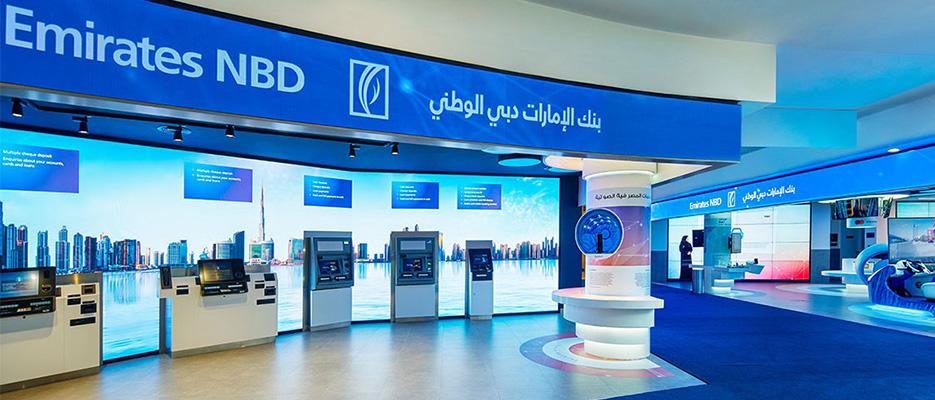Emirates NBD
Financial

Tapping twice to submit a cheque. Paying a bill from the couch. Checking your balance online. Digital banking is not only convenient but secure—and with over 94 percent of all financial transactions and requests conducted outside its 967 branches, Emirates National Bank of Dubai (NBD) is leading the way.
With more than 25,000 people representing 70 nationalities, Emirates NBD is one of the largest employers in the United Arab Emirates (UAE) with additional operations in Egypt, India, the Kingdom of Saudi Arabia, Singapore, the United Kingdom, China, and Turkey. The bank is responsible for $188 billion in total assets from 14 million customers and was named “Best Digital Bank in the Middle East” at the Euromoney Awards for Excellence in 2019.
To ensure the bank continues to evolve with technology, Emirates NBD’ Vice President of Cloud and Data Platforms, Ali Rey, covers new digital platforms, public cloud usage, and the automation of CI/CD pipelines. His scope of work includes Emirates NBD’s digital transformation, called “Leap” internally, which was initiated in 2017. “One of the key technologies my team introduced was GitHub,” he explained. “We wanted to consolidate to the best of breed source control tool.” Emirates NBD previously used disparate tools and shared folders, but as they started to modernize, “we needed something that could keep up.”

Before the Leap transformation began, “we were very much at the behest of vendors,” said Rey. The ability to grow or change was contingent on if and when vendors could fit Emirates NBD into their roadmap. “A priority for us wasn’t always a priority for them.” When they tried to drive application usage, license fees were exhaustive. “The more we consumed, the more expensive it became.” They’ve since leveraged GitHub to modernize both their technology and IT department. “We shifted to become more of an engineering-led team that builds our solutions automating, standardizing, and securing them.” Today, “the bank is driven by and runs on technology, so having all our source code known, checked in, and version-controlled is key.”
Emirates NBD started with 10 GitHub licenses and now has the most extensive user base in the Middle East. “Our whole engineering mindset and capability has grown out of people sharing code with GitHub,” said Rey. Before, there would be four unpredictable ways to solve a simple problem like how to manage API tokens. Now, everything is standardized, and developers use best practices to push out better products. “That would never have been possible before GitHub. The ability for developers to come together, see each other’s code, share, and comment are just that much stronger.”
Before GitHub, development could easily take three or four months. Now, we’re developing and implementing releases on a daily and weekly basis.
Of the employees who use GitHub, half are developers, and “we’ve seen it take off for other teams,” said Rey. Thanks to a fully automated pipeline, developers can spend time writing code and less time-solving issues and debugging errors. “GitHub was one of the first tools that empowered us to enhance our CI/CD pipeline continually and push things faster and faster,” Rey said. “Before GitHub, development could easily take three or four months. Now, we’re developing and implementing releases on a daily and weekly basis.”

“Our time to market and ability to push changes and fix issues is faster than it’s ever been,” said Rey. A year ago, IT needed to tweak a mobile application. The change itself took five minutes, but the code quality review, security review, and sign-off took over 14 hours. Instead, “with GitHub, we’re down to 20 minutes.” For such a large company, this level of automation has a powerful ripple effect. “If there are 300+ pipelines and we’ve whittled 14 hours of testing and reviews down to 20 minutes each, that’s a huge amount of savings,” explained Rey. The efficiency also boosts developer morale. “It’s releasing a lot of frustration and tension.” Emirates NBD’s CI/CD capability continues to evolve and is 95 percent automated. “If you invest in building your automation, you don’t need to involve the testing, security, or code quality teams,” said Rey.
For example, when Emirates NBD noticed customers used WhatsApp to communicate, they took the initiative to become the first bank to launch WhatsApp banking globally. “We used GitHub to move it forward, and built a proof of concept in three days with our existing micro-services. In the past, that would have taken months.” Emirates NBD customers can now do their banking through WhatsApp. “Whenever customers want to interact with their bank, it’s available. It’s very much on-demand, 24/7.”

As a global bank responsible for securing billions of dollars in customer assets, Emirates NBD puts a priority on security being embedded in the pipeline. Today, employees can’t move a product into the development or system integration testing (SIT) environments without a security check. “We’re proactively identifying vulnerabilities and fixing them part of the build process.”
Looking forward, GitHub gives Emirates NBD the clout to attract exceptional talent. To demonstrate to potential new hires how they leverage the latest technology, Emirates NBD has a live interactive dashboard that captures metrics for Emirates NBD’ CI/CD pipeline and GitHub usage. Recently, a new hire who came from a global startup “enjoyed the tools, flexibility, and freedom” so much that they recruited three more people to join them. “GitHub is so intuitive that we don’t have to invest in training, management, or maintenance,” explained Rey. “It just runs. We give people access, and 100 percent of them already know how to use it.”
Four years ago, Emirates NBD was one of the first banks to start a digital transformation. “GitHub has had a profound impact on our source code control, automation ability, and recruiting reach,” said Rey. While Emirates NBD continues to set new standards for global digital banking, many other banks in the area are just starting their modernization journey. “They’re looking at what we’ve done in moving to a cloud-based architecture, to microservices, to a DevOps and automation-type methodology—and using us an example of how to advance.”
product
industry
location
number of seats
From flexible hosting to data‐powered security, get everything your team needs to build at their best.
Contact sales